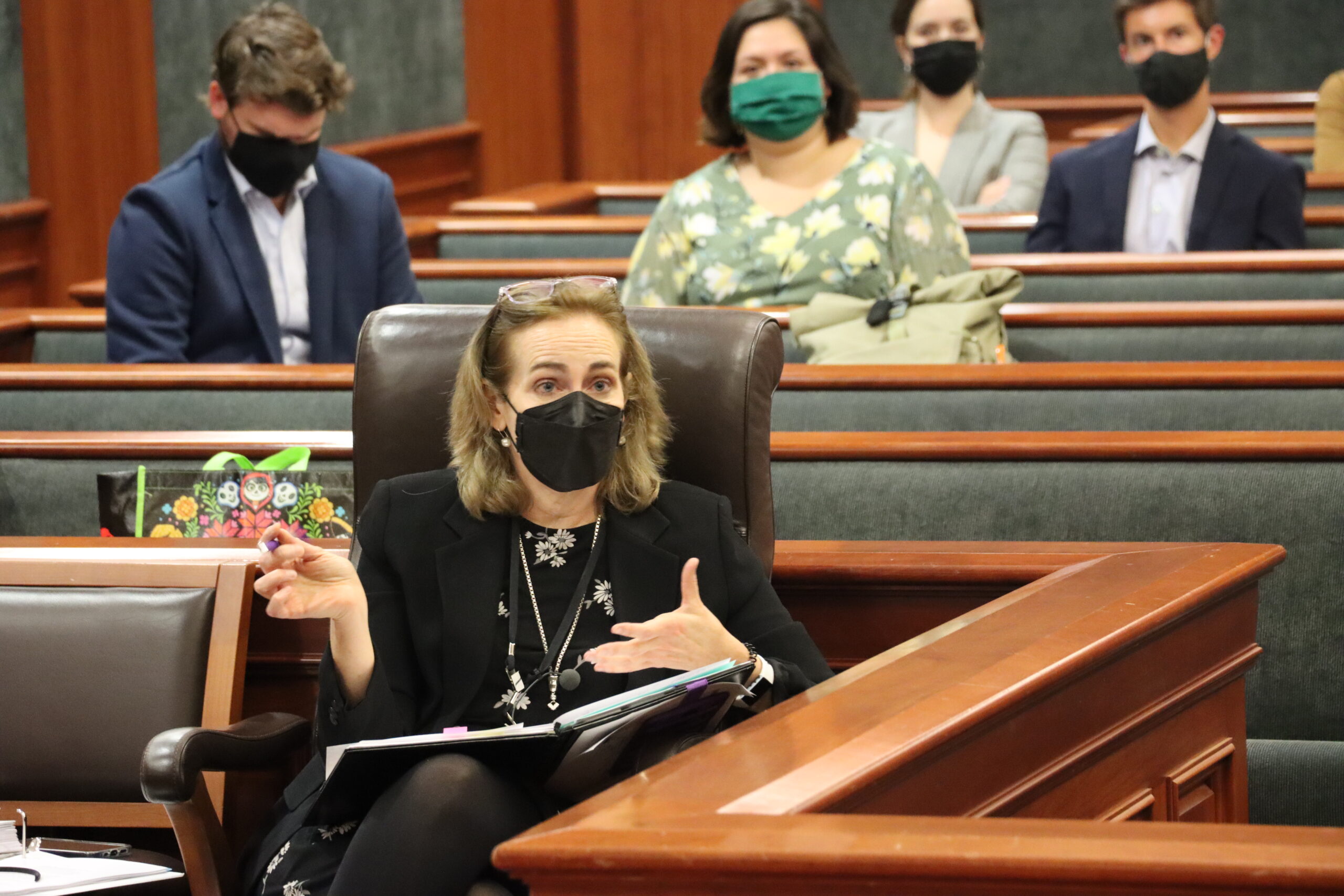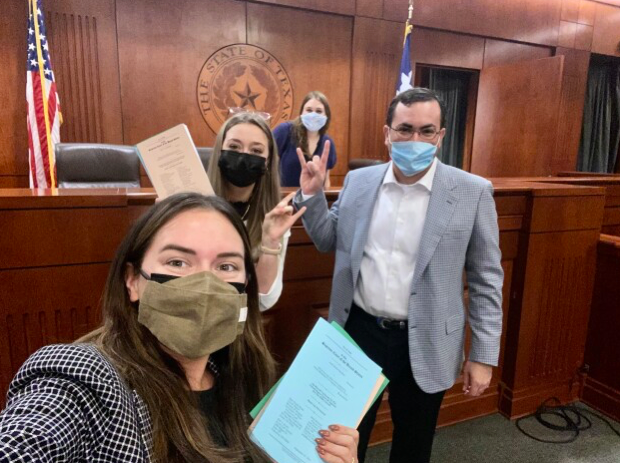In a remarkable show of dedication to justice and legal dexterity, the Texas Law community swiftly came together this fall to support petitioner John Henry Ramirez before the United States Supreme Court.
Background on Ramirez v. Collier:
- Petitioner John Henry Ramirez has been sentenced to death for a murder committed in Corpus Christi in 2004.
- He wants his pastor to pray out loud and lay hands on him as he is executed.
- The State of Texas has agreed to allow the pastor into the execution chamber but will not permit him to pray audibly or physically touch Ramirez, citing security reasons. But in the past Texas allowed this religious behavior to occur in hundreds of executions without incident.
- Ramirez is asking the Court to affirm his rights under the Religious Land Use and Institutionalized Persons Act (RLUIPA) and also argues that Texas’s policy violates the Free Exercise Clause of the First Amendment.
In early September, the Supreme Court stayed Ramirez’s execution a few hours after he had been scheduled to die by lethal injection. The question at the heart of his case is this:
Will Ramirez’s pastor be permitted to pray out loud and lay hands on him during his execution?
Seth Kretzer ’03, a former Articles Editor of the Texas Law Review, is Ramirez’s counsel of record. After the Court granted and expedited briefing, Kretzer reached out to the Supreme Court Clinic to partner with him on the case as merits co-counsel. He suggested the Clinic lead the briefing on the merits.
Under the expert supervision of Clinic Co-Directors Erin Busby, Lisa Eskow, and Michael Sturley, current and advanced Clinic students worked tirelessly on the merits brief, researching, drafting, cite-checking, and proofreading.
“The case and expedited briefing schedule called for fast-paced, rigorous legal research, analysis, and writing—skills that I have honed during my time in the Supreme Court Clinic and that will serve me well as I prepare for my career as a civil-rights litigator,” said 3L Zoraima Pelaez.
After two weeks of around-the-clock work and sleepless nights, the petitioner’s brief and all amicus briefs supporting the petitioner, as well as the United States’s amicus brief supporting neither party, had been filed.
“Our jobs were very research-intensive. Because of the expedited filing deadline, we had a very fast turnaround, and we had to jump in immediately,” said 3L Bonnie Devany. “One thing that you get from doing a Clinic that you don’t get from traditional law-school classes is working in a team—and that’s much more analogous to real-world legal practice.”
“I can’t emphasize enough the incredible commitment of our Clinic students,” said Professor Eskow. “This case called for nonstop lawyering from September 9 when we signed on as co-counsel to the 27th when we filed our opening brief. And the pressure continued as we had only 10 days to file our merits reply, and we also mooted Seth during that same window. The timeline overall was extraordinarily tight, and I’m extremely proud of what we accomplished. ”

Alumni and faculty answer the call for support.
Soon an unprecedented array of amicus briefs were filed by UT-related amici and counsel for amici.
Professor Steven Collis’s Law and Religion Clinic partnered as co-counsel with Professor Emeritus Douglas Laycock on a brief for scholar amici, including many other religious-liberty professors. “The case is an important one,” remarked Professor Collis, “And I’m grateful the Law & Religion Clinic could bring our expertise to bear to assist, not just in the amicus brief, but in mooting for oral argument and in thinking through the issues.”
“My teammate Duriba and I performed several rounds of case-law research to assist Professor Collis in preparing the amicus brief,” said 3L Nick Markwordt. “It was very exciting to work with renowned experts in religious-liberty law like Professor Laycock, and I enjoyed learning more about appellate advocacy by helping Mr. Kretzer prepare for oral arguments.”
TIMELINE OF EVENTS:
- September 9– Texas Law Supreme Court Clinic signs on as merits counsel in the Texas death-penalty/spiritual-advisor case the Court granted
- September 27–Ramirez’s opening merits brief and an extraordinary array of amici briefs are filed
- October 19– Moot for Kretzer is held in the Eidman Courtroom
- October 25–Ramirez’s merits reply brief is filed
- November 9– SCOTUS hears oral argument
Professor Michele Deitch is one of the amici on a brief about the Prison Litigation Reform Act, and she did not hesitate to help recruit other amici for the brief. Counsel of record on that brief is former Texas Law adjunct professor Jennifer Freel, and co-counsel is alumnus Josh Windsor ’18.
Deitch also recruited former prison-official amici from Texas and other states for a separate amicus brief for which David Frederick ’89 is counsel of record. Frederick co-founded the Supreme Court Clinic at Texas Law and is the winner of the 2018 Dean’s Honor for Appellate Advocacy. One of the additional counsel from Frederick’s firm on that brief is Texas Law and Supreme Court Clinic alum Matthew Wilkins ’17.
Further support arrived from a group of federal prison officials and spiritual advisors who filed an amicus brief for which alumna Lisa Blatt ’89 serves as counsel of record, joined by the ACLU as co-counsel.
“What I love most about this school is the community it creates of students, faculty, and graduates. The collaboration between all of them on this case is amazing,” remarked Dean Ward Farnsworth. “I’m so proud to see what we’re able to do when it’s ‘all hands on deck.’”
Moot in the Eidman Courtroom
On October 19, Texas Law held a moot in the Eidman Courtroom to help Kretzer prepare for oral argument.

Joining Professors Busby, Eskow, and Sturley on the panel were Professor Collis and Shawn Nolan, Chief of the Capital Habeas Unit in the Federal Community Defender Office for the Eastern District of Pennsylvania, who traveled to Austin to take part.
During the moot, the panelists peppered Kretzer with questions about the case, delving deeply into both the legal doctrines involved and the record. Students questioned Kretzer next, after which the panelists, students, and Kretzer debriefed the formal portion of the moot and discussed oral-argument strategy moving forward.
Oral Argument
Kretzer presented oral argument to the Court on November 9. Although it is often difficult to predict results based on questions asked during oral argument, it seemed clear that the justices are likely to be divided when a decision issues. But when that will happen is uncertain.
“We will definitely have a decision before the end of June,” explained Professor Busby. “And it probably will be closer to the beginning of the year, based on the expedited schedule the Court set for briefing and argument.” Will the state get to enforce its current restrictions on religious exercise in the execution chamber, or will the Court affirm Ramirez’s right to have his pastor pray aloud and lay hands on him as he dies? Stay tuned.
